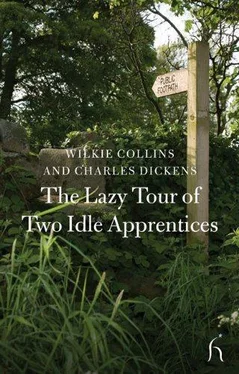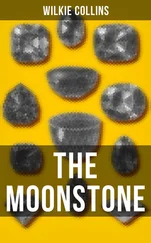Wilkie Collins - The Lazy Tour of Two Idle Apprentices
Здесь есть возможность читать онлайн «Wilkie Collins - The Lazy Tour of Two Idle Apprentices» весь текст электронной книги совершенно бесплатно (целиком полную версию без сокращений). В некоторых случаях можно слушать аудио, скачать через торрент в формате fb2 и присутствует краткое содержание. Жанр: Классическая проза, на английском языке. Описание произведения, (предисловие) а так же отзывы посетителей доступны на портале библиотеки ЛибКат.
- Название:The Lazy Tour of Two Idle Apprentices
- Автор:
- Жанр:
- Год:неизвестен
- ISBN:нет данных
- Рейтинг книги:5 / 5. Голосов: 1
-
Избранное:Добавить в избранное
- Отзывы:
-
Ваша оценка:
- 100
- 1
- 2
- 3
- 4
- 5
The Lazy Tour of Two Idle Apprentices: краткое содержание, описание и аннотация
Предлагаем к чтению аннотацию, описание, краткое содержание или предисловие (зависит от того, что написал сам автор книги «The Lazy Tour of Two Idle Apprentices»). Если вы не нашли необходимую информацию о книге — напишите в комментариях, мы постараемся отыскать её.
The Lazy Tour of Two Idle Apprentices — читать онлайн бесплатно полную книгу (весь текст) целиком
Ниже представлен текст книги, разбитый по страницам. Система сохранения места последней прочитанной страницы, позволяет с удобством читать онлайн бесплатно книгу «The Lazy Tour of Two Idle Apprentices», без необходимости каждый раз заново искать на чём Вы остановились. Поставьте закладку, и сможете в любой момент перейти на страницу, на которой закончили чтение.
Интервал:
Закладка:
Doctor Speddie politely assented to the proposition of Francis Goodchild, ‘as it would give him the pleasure of enjoying a few more minutes of Mr. Goodchild’s society than he could otherwise have hoped for,’ and they went out together into the village street. The rain had nearly ceased, the clouds had broken before a cool wind from the north-east, and stars were shining from the peaceful heights beyond them.
Doctor Speddie’s house was the last house in the place. Beyond it, lay the moor, all dark and lonesome. The wind moaned in a low, dull, shivering manner round the little garden, like a houseless creature that knew the winter was coming. It was exceedingly wild and solitary. ‘Roses,’ said the Doctor, when Goodchild touched some wet leaves overhanging the stone porch; ‘but they get cut to pieces.’
The Doctor opened the door with a key he carried, and led the way into a low but pretty ample hall with rooms on either side. The door of one of these stood open, and the Doctor entered it, with a word of welcome to his guest. It, too, was a low room, half surgery and half parlour, with shelves of books and bottles against the walls, which were of a very dark hue. There was a fire in the grate, the night being damp and chill. Leaning against the chimney-piece looking down into it, stood the Doctor’s Assistant.
A man of a most remarkable appearance. Much older than Mr. Goodchild had expected, for he was at least two-and-fifty; but, that was nothing. What was startling in him was his remarkable paleness. His large black eyes, his sunken cheeks, his long and heavy iron-grey hair, his wasted hands, and even the attenuation of his figure, were at first forgotten in his extraordinary pallor. There was no vestige of colour in the man. When he turned his face, Francis Goodchild started as if a stone figure had looked round at him.
‘Mr. Lorn,’ said the Doctor. ‘Mr. Goodchild.’
The Assistant, in a distraught way—as if he had forgotten something—as if he had forgotten everything, even to his own name and himself—acknowledged the visitor’s presence, and stepped further back into the shadow of the wall behind him. But, he was so pale that his face stood out in relief again the dark wall, and really could not be hidden so.
‘Mr. Goodchild’s friend has met with accident, Lorn,’ said Doctor Speddie. ‘We want the lotion for a bad sprain.’
A pause.
‘My dear fellow, you are more than usually absent to-night. The lotion for a bad sprain.’
‘Ah! yes! Directly.’
He was evidently relieved to turn away, and to take his white face and his wild eyes to a table in a recess among the bottles. But, though he stood there, compounding the lotion with his back towards them, Goodchild could not, for many moments, withdraw his gaze from the man. When he at length did so, he found the Doctor observing him, with some trouble in his face. ‘He is absent,’ explained the Doctor, in a low voice. ‘Always absent. Very absent.’
‘Is he ill?’
‘No, not ill.’
‘Unhappy?’
‘I have my suspicions that he was,’ assented the Doctor, ‘once.’
Francis Goodchild could not but observe that the Doctor accompanied these words with a benignant and protecting glance at their subject, in which there was much of the expression with which an attached father might have looked at a heavily afflicted son. Yet, that they were not father and son must have been plain to most eyes. The Assistant, on the other hand, turning presently to ask the Doctor some question, looked at him with a wan smile as if he were his whole reliance and sustainment in life.
It was in vain for the Doctor in his easy-chair, to try to lead the mind of Mr. Goodchild in the opposite easy-chair, away from what was before him. Let Mr. Goodchild do what he would to follow the Doctor, his eyes and thoughts reverted to the Assistant. The Doctor soon perceived it, and, after falling silent, and musing in a little perplexity, said:
‘Lorn!’
‘My dear Doctor.’
‘Would you go to the Inn, and apply that lotion? You will show the best way of applying it, far better than Mr. Goodchild can.’
‘With pleasure.’
The Assistant took his hat, and passed like a shadow to the door.
‘Lorn!’ said the Doctor, calling after him.
He returned.
‘Mr. Goodchild will keep me company till you come home. Don’t hurry. Excuse my calling you back.’
‘It is not,’ said the Assistant, with his former smile, ‘the first time you have called me back, dear Doctor.’ With those words he went away.
‘Mr. Goodchild,’ said Doctor Speddie, in a low voice, and with his former troubled expression of face, ‘I have seen that your attention has been concentrated on my friend.’
‘He fascinates me. I must apologise to you, but he has quite bewildered and mastered me.’
‘I find that a lonely existence and a long secret,’ said the Doctor, drawing his chair a little nearer to Mr. Goodchild’s, ‘become in the course of time very heavy. I will tell you something. You may make what use you will of it, under fictitious names. I know I may trust you. I am the more inclined to confidence to-night, through having been unexpectedly led back, by the current of our conversation at the Inn, to scenes in my early life. Will you please to draw a little nearer?’
Mr. Goodchild drew a little nearer, and the Doctor went on thus: speaking, for the most part, in so cautious a voice, that the wind, though it was far from high, occasionally got the better of him.
When this present nineteenth century was younger by a good many years than it is now, a certain friend of mine, named Arthur Holliday, happened to arrive in the town of Doncaster, exactly in the middle of a race-week, or, in other words, in the middle of the month of September. He was one of those reckless, rattle-pated, open-hearted, and open-mouthed young gentlemen, who possess the gift of familiarity in its highest perfection, and who scramble carelessly along the journey of life making friends, as the phrase is, wherever they go. His father was a rich manufacturer, and had bought landed property enough in one of the midland counties to make all the born squires in his neighbourhood thoroughly envious of him. Arthur was his only son, possessor in prospect of the great estate and the great business after his father’s death; well supplied with money, and not too rigidly looked after, during his father’s lifetime. Report, or scandal, whichever you please, said that the old gentleman had been rather wild in his youthful days, and that, unlike most parents, he was not disposed to be violently indignant when he found that his son took after him. This may be true or not. I myself only knew the elder Mr. Holliday when he was getting on in years; and then he was as quiet and as respectable a gentleman as ever I met with.
Well, one September, as I told you, young Arthur comes to Doncaster, having decided all of a sudden, in his harebrained way, that he would go to the races. He did not reach the town till towards the close of the evening, and he went at once to see about his dinner and bed at the principal hotel. Dinner they were ready enough to give him; but as for a bed, they laughed when he mentioned it. In the race-week at Doncaster, it is no uncommon thing for visitors who have not bespoken apartments, to pass the night in their carriages at the inn doors. As for the lower sort of strangers, I myself have often seen them, at that full time, sleeping out on the doorsteps for want of a covered place to creep under. Rich as he was, Arthur’s chance of getting a night’s lodging (seeing that he had not written beforehand to secure one) was more than doubtful. He tried the second hotel, and the third hotel, and two of the inferior inns after that; and was met everywhere by the same form of answer. No accommodation for the night of any sort was left. All the bright golden sovereigns in his pocket would not buy him a bed at Doncaster in the race-week.
Читать дальшеИнтервал:
Закладка:
Похожие книги на «The Lazy Tour of Two Idle Apprentices»
Представляем Вашему вниманию похожие книги на «The Lazy Tour of Two Idle Apprentices» списком для выбора. Мы отобрали схожую по названию и смыслу литературу в надежде предоставить читателям больше вариантов отыскать новые, интересные, ещё непрочитанные произведения.
Обсуждение, отзывы о книге «The Lazy Tour of Two Idle Apprentices» и просто собственные мнения читателей. Оставьте ваши комментарии, напишите, что Вы думаете о произведении, его смысле или главных героях. Укажите что конкретно понравилось, а что нет, и почему Вы так считаете.











